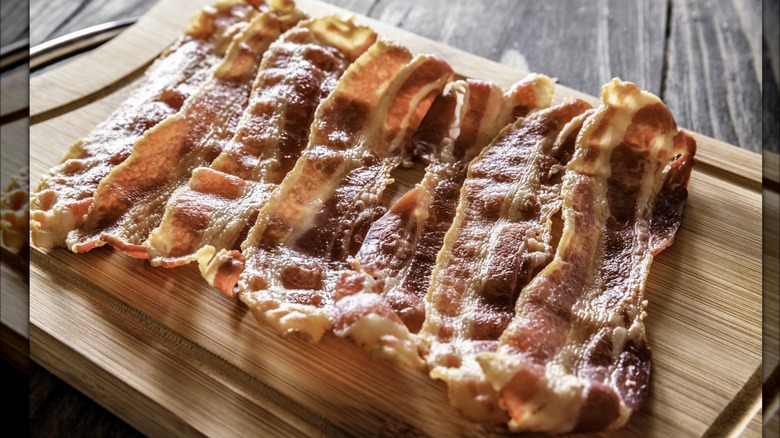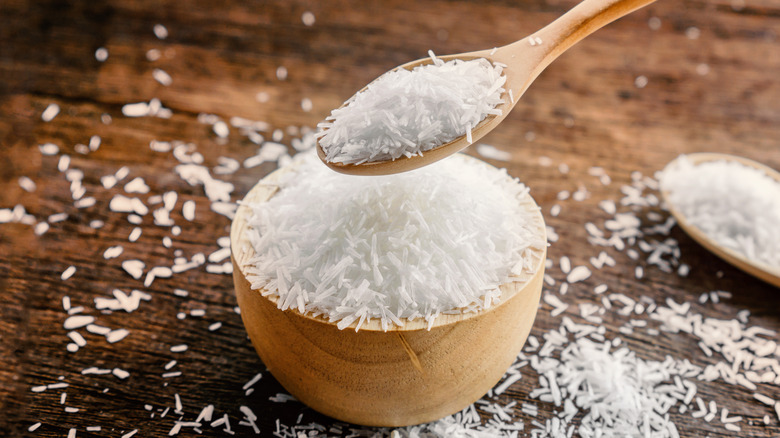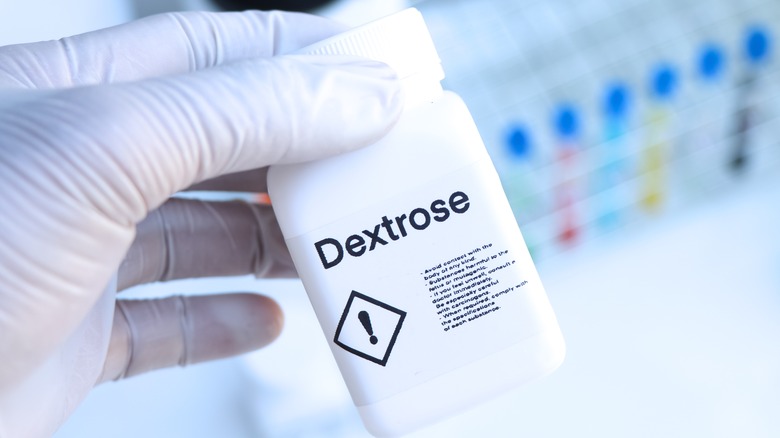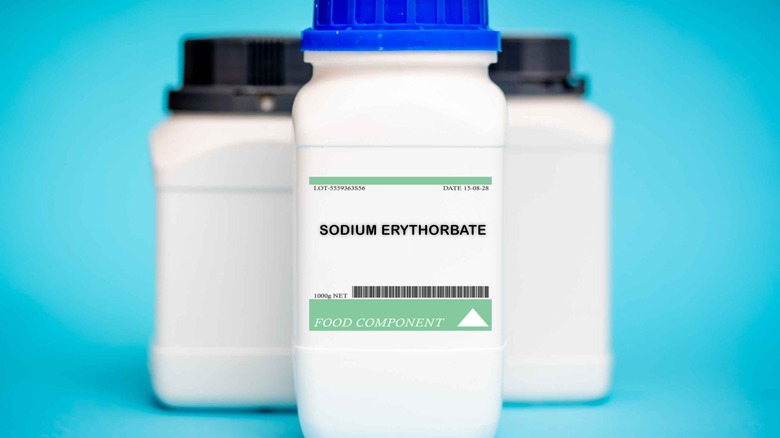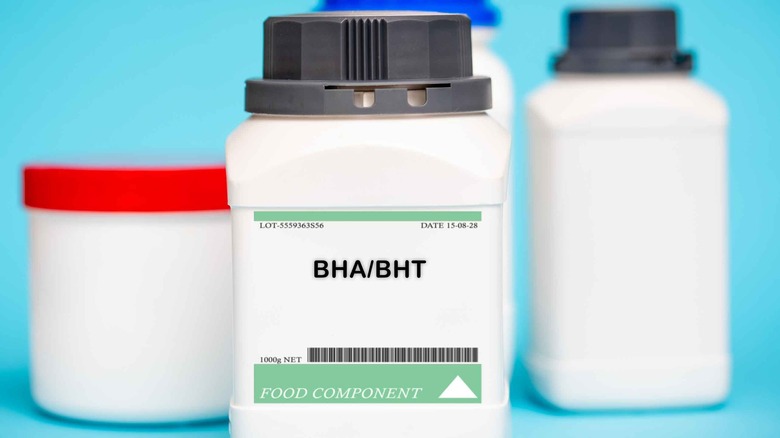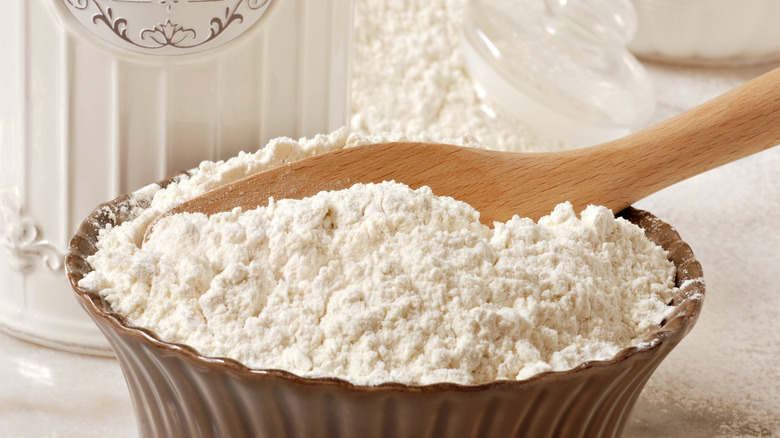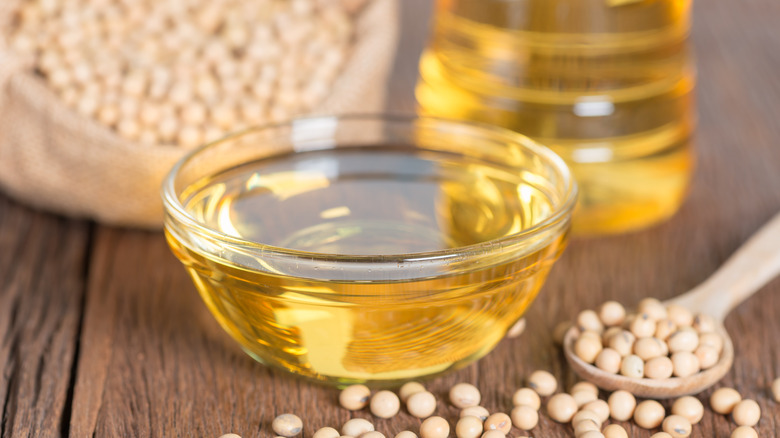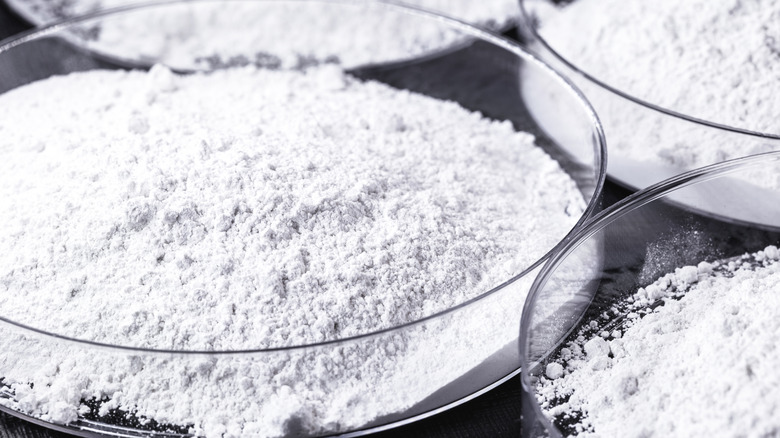What's Really In Your Breakfast Biscuit Meat?
Upon biting into a deliciously hot breakfast biscuit sandwich, we doubt the first thing that enters your mind is, "I wonder what's in the meat?" Even so, we here at Mashed believe it is important to not only enjoy the way your food tastes, but also to remain informed about what exactly is making it taste that way.
Breakfast biscuit meat provides a uniquely savory flavor that makes the dish a warm and comforting way to start the day. While not all ingredients found within fast food sausage, bacon, and ham are particularly nefarious, you may be interested in uncovering the details concerning a few ingredients that some common breakfast meats contain. From the role that each ingredient plays to potentially dangerous additives, we'll break down some of the most common components you'll find in a breakfast biscuit meat sandwich so you can stay informed about what goes in your body. And with that, let's dig into the savory details!
Sodium nitrite
Sodium nitrite is an ingredient you may find in your breakfast biscuit meat. Wendy's Bacon, Egg, and Cheese Biscuit contains sodium nitrite, as does the applewood smoked bacon contained in McDonald's Bacon, Egg & Cheese Biscuit. In general, you'll find that most places that include bacon on the biscuit breakfast sandwiches contain nitrite since this is a common preserving ingredient used in cured meats.
Sodium nitrate and sodium nitrite have carried a controversial connotation for quite a while. Because large amounts of these compounds can lead to the formation of cancer-causing nitrosamines, the fear is that consuming these on a regular basis will increase the risks for cancer (via the University of Wisconsin-Madison). It is for this reason that nitrites and nitrates face strict regulation when added to food, and may even be coupled with other ingredients, such as vitamin C in the form of ascorbic acid in order to further reduce the risks associated with consuming nitrates and nitrites.
With that said, it is important to note that nitrates and nitrites, despite their potential risks, play an important part in the preservation of meat. They prevent bacteria from forming and can increase the shelf-life of foods. Still, people are often urged to limit their consumption of foods containing nitrites and nitrates to further reduce the health risks commonly associated with them.
Monosodium glutamate
Monosodium glutamate, also known as MSG, may be lurking in your breakfast biscuit meat, though this isn't always the case. MSG is responsible for adding depth and flavor to savory foods by amplifying the taste and adding a rich umami flavor that can be difficult to resist. Monosodium glutamate has garnered negative attention for causing unwanted symptoms in individuals, though this has since been understood to mostly only affect those sensitive to or intolerant of the substance.
Monosodium glutamate is most often found in sausages, so you may occasionally find the ingredient hidden in your sausage, egg, and biscuit. Still, it is important to note that not all sausages contain this controversial additive, so proper research is needed if you are actively trying to avoid it. We know with certainty that Whataburger's Biscuit Sandwich have MSG lurking, while other chains, like Wendy's, feature pork patties that contain no such thing. If you think you may be sensitive to MSG or would rather avoid it for your own reasons, be sure to inquire about the ingredients in your sausage biscuit ahead of time in order to avoid any unsavory consequences that consuming monosodium glutamate could potentially cause.
Dextrose
McDonald's Sausage Biscuit with Egg and the Wendy's Classic Sausage, Egg, and Cheese Biscuit are only two of the biscuit sandwiches you may find with dextrose in the meat. Dextrose is a form of sugar and is used for much the same reason regular sugar is. In addition to serving as a sweetening agent, dextrose also aids in the preservation of certain foods.
Because of the makeup of dextrose, those who are struggling with insulin issues need to be aware that dextrose is very similar to glucose naturally found in the blood. It can cause blood sugar surges much like regular sugar, and therefore, diabetics and others who may have trouble controlling blood sugar levels may need to keep an eye on this particular ingredient, especially when consumed in excess (via WebMD).
Bear in mind also that you're very likely to encounter dextrose in a variety of other packaged or processed foods that reach far beyond breakfast biscuit meat. Dextrose shows up in many fast food menu items (even french fries), so if you see this additive the next time you look over an ingredient list, know that it's likely used for its sweetening and preserving properties.
Sodium erythorbate
Sodium erythorbate isn't found in all breakfast meat, but it seems to be a somewhat common ingredient in cured meats like bacon. We've found this additive in the Whataburger's Biscuit with Bacon and also in the McDonald's Bacon, Egg, and Cheese Biscuit.
So, what's its purpose? First and foremost, we want to warn you that any hilarious claims about sodium erythorbate being ground-up earthworms are certainly false. The true purpose of sodium erythorbate seems to be two-fold. On one hand, the additive helps aid in the curing process. Remember those nitrites we discussed earlier? The addition of sodium erythorbate helps expedite the curing procedure by converting nitrite for an overall faster cure.
In addition, sodium erythorbate will help enhance the color of cured meat, often giving it that satisfyingly even red hue we often associate with bacon, smoked sausage, and the like. Still, as with most additives, not everyone will take so well to sodium erythorbate. Though rare, some may experience temporary side effects that include headache, body flushing, and fatigue (via Healthfully). If you experience these symptoms, be sure to speak with your health professional to determine if a sensitivity to sodium erythorbate could be the cause of any short-term, unwanted symptoms you are experiencing.
BHA and BHT
Have you ever noticed BHA or BHT listed as ingredients in your packaged food? Expect it to show up in your breakfast biscuit meat as well. Though commonly used in dry goods, BHA and BHT (otherwise known as butylated hydroxyanisole and butylated hydroxytoluene, respectively) make their appearance in sausage as well. Their purpose? To stunt the growth of bacteria or mold by preventing oxygen from changing the food. These antioxidants also help to retain nutrients in food, and thus, are important additives that work to keep your breakfast biscuit meat safe.
Despite its usefulness in preservation attempts and the inhibiting of rancidity, BHA and BHT may have downsides. While research is still ongoing, some evidence suggests these antioxidants may lead to cancer, and interact negatively with birth control and steroid hormone drugs when consumed in excess (via Verywell Fit). Because of this, it may be a good idea to keep an eye out for these helpful yet potentially harmful additives, especially if you tend to consume meat or dry goods containing these substances regularly.
Oh, and just so you know, we've only found Whataburger Biscuit with Sausage containing BHA and BHT ingredients. None of the other breakfast biscuit sandwiches we've researched contained them, though, as mentioned before, not all restaurants openly list nutrition facts for the breakfast biscuit goodies.
Gluten
There are some instances in which some types of meat, especially sausages, contain filler. These fillers can sometimes include wheat and, therefore, will contain gluten. While we were unable to find any restaurants using wheat flour in their sausage breakfast biscuit meat, countless restaurants don't disclose the exact ingredients that are put in the breakfast sandwiches. We can reason that since many sausages contain filler, there is a possibility that some sausage types contained in biscuit sandwiches contain gluten. This will prove especially true for biscuit sandwiches containing smoked sausage, such as the Smoked Sausage Biscuit sold at Jack's.
Of course, if you're eating a breakfast biscuit sandwich anyway, the assumption is that you probably aren't too concerned about gluten to begin with. Still, we think it helps to stay informed and know that certain meats, especially those of lower quality, will contain filler as a means to save on the cost of meat, while also making sausages and other meat types appear fuller and more plump than they actually are.
Extracts
Rosemary and sage extracts are sometimes found in food, though their purpose may not be what you think. Both rosemary and sage extracts, like those found in McDonald's Sausage Biscuit patties, aren't there to make the patty taste good. Instead, these compounds often found in patties work as a preserver for the meat, keeping it fresh in a non-toxic natural way. Rosemary, specifically, has a very similar effect on meat that additives like BHT and BHA do, yet in a natural form. Its antioxidant-like qualities, along with its ability to prohibit harmful germs, make it ideal for use in items like sausage patties, thereby making your breakfast biscuit sammie that much safer to eat.
Still, you should note that while herbal extracts like these don't typically cause negative reactions in most folks, consuming too much of them might cause negative health consequences, such as vomiting and drug interactions (via MedicalNewsToday). Even so, the amount contained in your breakfast biscuit meat is unlikely to do much harm, so you shouldn't feel too worried if you see these ingredients crop up on your favorite breakfast biscuit ingredient list.
Natural spices
"Natural" spices and flavors are often added to meats to make them more flavorful. Much like you'd add seasoning to a piece of meat you'd make at home, spices usually serve the purpose of enhancing the taste of food. Know, however, that though the term "natural" flavoring can get muddled, it is not composed of monosodium glutamate. The reason for this is that MSG must be declared exclusively as an ingredient on the label. What those inconspicuous spices could be, however, is the use of natural seasonings that the company failed to list, which we know can prove rather frustrating for curious food enthusiasts, or those who simply want to remain informed about what they are putting in their bodies.
Thankfully, there are some spices, like those listed in Wendy's Honey Butter Chicken Biscuit, that are listed outright. Yummy additions like garlic powder, onion powder, chicken broth, and turmeric are just what we want to see, as these are ingredients we'd also put on a homemade meal. Still, we see the additional vague phrase "spices" crop up on the same Wendy's Honey Butter Chicken ingredients list, which makes us a little suspicious. There's no way to decipher which spices are which when companies refuse to reveal them, so we'll just have to accept that the spices are natural just as companies declare them to be ... at least, for now.
Citric acid
Citric acid, though seemingly unharmful, is actually derived from black mold in its manufactured form. Shockingly, you can expect to find citric acid in your breakfast biscuit meat, but that doesn't necessarily mean that it's unsafe. To be clear, all citric acid is not derived from black mold. In fact, citric acid is naturally found in citrus fruits, hence its name. You can expect to find citric acid in lemons, limes, and oranges, but these are all organic forms of citric acid. Organic citric acid was first discovered in 1784, but by the 1900s scientists unearthed the fact that it could also be manufactured from black mold. Today, this manufactured version of citric acid is used in meat and other products for preservation purposes, as well as to add a pleasant tangy flavor to food.
Despite the fact that citric acid is deemed safe for consumption, some people may find they are sensitive to the manufactured form of the substance. In this case, a person might suffer from abdominal cramping, stiffness, joint pain, and other sorts of unsavory symptoms (via Healthline). As always, if you suspect that you are sensitive to citric acid, please do your research and remain informed before eating products that contain such a substance.
Hydrogenated soybean oil
Hydrogenated soybean oil, along with several other soy-related ingredients, are often found in breakfast biscuit meat. The use of hydrogenated oil should not be confused with partially hydrogenated oil, which is known for its extremely adverse health ramifications, including the increase of "bad" cholesterol" and the decrease of "good" cholesterol.
With this in mind, it's important to note that just because an oil is fully hydrogenated doesn't mean you are out of the health-risk ballpark just yet. Hydrogenated vegetable oils, such as hydrogenated soybean oil, can still pose a health hazard, as they may cause inflammation, have an impact on heart health, and cause fluctuating blood sugar levels (via Healthline).
Despite its adverse health effects, it's important to note that there was only one breakfast biscuit sandwich we were able to find that made use of hydrogenated soybean oil, and that was Wendy's Honey Butter Chicken Biscuit. Still, because so many restaurants fail to post the ingredients in the breakfast biscuits, we are willing to bet that many biscuit sandwiches featuring fried chicken or steak are liable to contain similar hydrogenated oil ingredients. Thus, consumption of these menu items in moderation is likely preferred.
Sodium phosphate
Sodium phosphate is an additive that you may find in your breakfast biscuit meat, and, as usual, you probably aren't sure of the purpose of it being there. Sodium phosphate is basically sodium and phosphate used in tandem for a variety of purposes. For example, sodium phosphate may be used to help thicken the consistency of a product, emulsify liquids, balance the pH in food, act as a leavener, or cure meat. In terms of biscuit breakfast meat, sodium phosphate is most likely used to maintain the moisture in the meat and extend its shelf life.
We found sodium phosphate in breakfast biscuit sandwiches that contain bacon (such as Whataburger and McDonald's), mostly because the sodium phosphate, as mentioned, keeps the bacon moist and prohibits it from going rancid. Still, it's important to note that when consumed in high doses, sodium phosphate can have a negative impact on your health. Though phosphate is naturally occurring, it reacts differently in the human body. You can expect too much sodium phosphate to increase your risk of death, accelerate aging, and have other harrowing effects on your health (via Healthline).
Because of these facts, it is recommended that you limit the amount of sodium phosphate in your diet. Those consuming an excessive amount of processed food, including breakfast biscuit meat, should be especially leery of this ingredient since it has been associated with multiple dire health issues when consumed long-term.
Natural smoke flavor
Natural smoke flavor is often added to bacon, so if you see it on your breakfast biscuit meat ingredient list, you shouldn't be surprised. Just as it would seem, natural smoke flavor adds a touch of deliciousness to bacon that makes it extremely enjoyable to eat, even if it wasn't actually smoked over a real flame.
Now, we know what you might be thinking. "Smoke" flavor, though labeled as natural, doesn't sound very organic, does it? We agree. Still, we must contend that according to several sources, natural smoke does not have the same potentially carcinogenic effect that inhaling smoke does, and thus, the liquid version of the stuff may actually be safer than smoke from the flame itself. So, how is liquid smoke derived? Natural liquid smoke is created by taking the moisture from wet wood after it has been burned. The result is a highly concentrated yummy flavoring that can be used to enhance bacon taste, while simultaneously amplifying your overall breakfast biscuit flavor experience. Count us in!

